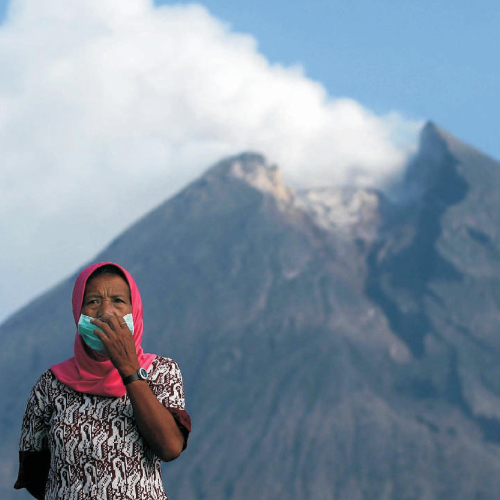Department of Earth Sciences

Welcome to the Department of Earth Sciences
The Department of Earth Sciences submitted 35 members of staff, comprising 34.86 Full-Time Equivalent (FTE) staff, to the REF Earth Systems and Environmental Sciences Unit of Assessment (UoA). The submission included one Early Career Researcher.
Protecting global communities from harmful volcanic emissions
Our Earth Sciences research is helping communities living near active volcanoes, and the agencies protecting them, to reduce exposure to volcanic emissions.
About Us
Strategy, goals and future plans of the department include continuing to build a resilient research community with a diverse range of research income sources, including from research councils and industry and fostering interdisciplinary research that matters (including climate and data science).
During the last REF period, over £100k each was secured from more than 20 different funding sources, with lots of recent appointments, we have a young and dynamic staff team covering a wide range of Earth Science disciplines. These include important growth areas in natural hazards, resources, and climate science. The department provides an open, collaborative, and equitable workplace in which researchers at all career stages are supported to pursue ambitious and rigorous research, and to deliver impact.
We are proud that our REF success reflects the environment we have built together. Research impact is achieved across the range of disciplines. Our impact success reflects the pivot Earth Sciences is making towards finding solutions for society’s present and future needs. We provide a modern research-led teaching portfolio, that aims to provide the best opportunities for our students, including the only BSc in Climate Science in the UK.
Earth Sciences REF Impact Case Studies
Earth Sciences submitted three impact case studies including volcanic eruptions and renewable energy.
Click below to read more about our case studies
Opening-up Fractured Basement Petroleum Reservoirs
Geological age relationships to define economic metal resource potential
Preparing for volcanic eruptions: protection of public health by governmental (GO) and non-governmental (NGO) agencies
Research Themes
Our research is organised into three broad themes: Earth Surface Processes and Hazards, Climate, Environment and Resources, and Physics and Chemistry of Earth and Planetary Processes.
Like to Know More?
Departmental research is built on collaboration among researchers with diverse technical expertise, within and across themes, and exploits the interdisciplinary opportunities afforded by Durham’s Research Institutes.
The Department engages extensively with, and takes leadership roles in, the Durham Energy Institute, the Institute of Hazard, Risk and Resilience, and the Institute of Advanced Study.



/prod01/prodbucket01/media/durham-university/departments-/earth-sciences/60265.jpg)
/prod01/prodbucket01/media/durham-university/departments-/earth-sciences/60224.jpg)
/prod01/prodbucket01/media/durham-university/departments-/earth-sciences/60184.jpg)

/prod01/prodbucket01/media/durham-university/departments-/earth-sciences/news/2021/sam_thorpe_digitising.jpg)
/prod01/prodbucket01/media/durham-university/research-/research-institutes/durham-energy-institute/landscapes-cityscapes-montages-etc/Ana-Rakonjac-1.jpg)